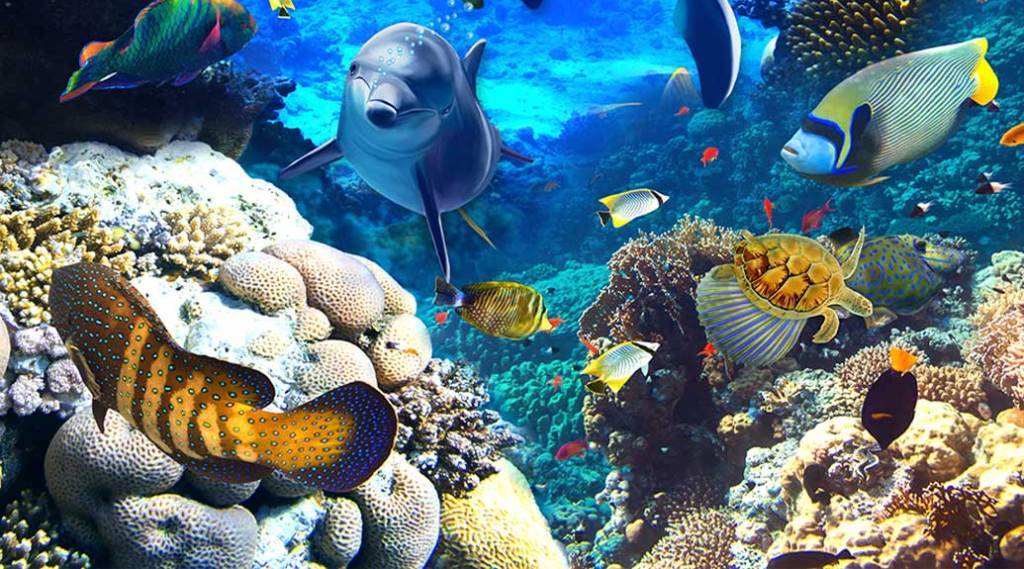(单词翻译:单击)
听力文本
Scientists Say Ocean Warming May Greatly Reduce Sea Life
The world's oceans will likely lose about one-sixth of their fish and other creatures within 100 years if climate change continues on its current path.
These are the findings of a wide-reaching, computer-based study by an international team of marine biologists.
Every degree Celsius that the world's oceans warm, their biomass — or the total weight of all the marine animal life — is expected to drop five percent, the study also found.
The study predicts that if there is no change in the rate of worldwide greenhouse gas production, there will be a 17-percent loss of biomass by the year 2100.
But, if the world reduces carbon pollution, biomass losses could be limited to only about 5 percent.
William Cheung is a marine ecologist at the University of British Columbia in Canada. He co-wrote the study, and told the Associated Press, "There are already changes that have been observed."
Warming temperatures are the biggest issue, Cheung said. But climate change also produces oceans that are more acidic and have less oxygen. This also harms sea life.
Much of the world depends on the oceans for food or work, the scientists say.

University of Victoria biology professor Julia Baum was not part of the study, but she said the findings make sense. She noted that the possible effects of the predicted losses of animal life are huge.
"Climate change has the potential to cause serious new conflicts over ocean resource use and ... food security ... as (the) human population continues to grow," said Baum.
Marine biologist Boris Worm, who helped run the study, added that the "building blocks of marine life – plankton and bacteria – may decline less heavily."
That is the good news, he said. The bad news?
"Those marine animals that we use directly, and care about most deeply, are predicted to suffer the most," said Worm. He works at Canada's Dalhousie University.
Scientists had already believed climate change would likely reduce future ocean life. But past computer-based studies looked at only part of the picture or used only one model. The latest study used six different computer models to give the best picture look yet, William Cheung said.
University of Georgia marine biologist Samantha Joye was not part of the research. But she praised the study as well researched and extremely detailed, and called it "an urgent call for action."
"Healthy oceans are required for planetary stability," Joye said.
I'm Pete Musto.
重点解析
重点讲解:
1. depend on 依靠;依赖;
They may hate what he does but their survival depends on him.
他们或许讨厌他的营生,但他们要想活下来必须依靠他。
2. make sense 可以理解;讲得通;
It makes sense to eat a reasonably balanced diet when slimming.
在减肥过程中保持饮食的营养相对均衡是明智的。
3. care about 关注;在意;担忧;
She cares deeply about environmental issues.
她对环境问题深感担忧。
4. look at 思考;考虑;研究;
The implications of the new law will need to be looked at.
新法规可能造成的影响需要仔细研究一下。
参考译文
科学家警告称海洋变暖可能导致海洋生物大幅减少
如果气候变化按目前状态持续,那在100年内,全球海洋可能会损失约六分之一的鱼类和其他海洋生物。
这些结果来自国际海洋生物学家团队进行的一项以计算机为基础的广泛研究。
研究还发现,全球海洋温度每升高1摄氏度,海洋生物的总量会相应下降5%。
研究预测称,如果全球温室气体排放量保持不变,到2100年,海洋生物量将损失17%。
但如果世界减少碳污染,损失可能会限制在只有5%左右。
威廉·张是加拿大不列颠哥伦比亚大学的海洋生态学家。他也是这项研究的共同作者,他对美联社表示:“现在已经观察到了一些变化。”
张表示,气温升高是最重要的因素。但气候变化也会使海洋中的酸性更强、氧气更少。这同样会损害海洋生物。
科学家表示,全球大部分地区都依靠海洋来获取食物或生计。
维多利亚大学的生物学教授朱莉亚·鲍姆并未参与这项研究,但她表示,研究结果言之有理。她指出,所预测生物损失的潜在后果是巨大的。
鲍姆说,“随着人口持续增长,气候变化有可能对海洋资源利用和食品安全造成新的严重冲击。”
海洋生物学家鲍里斯·沃姆为这项研究提供了帮助,他表示,“海洋生物的基石——浮游生物和细菌——可能不会严重减少。”
他说,这是好消息。那坏消息呢?
沃姆说,“那些我们直接利用而且最关心的海洋生物,可能会受到最大影响。”沃姆在加拿大达尔豪斯大学工作。
科学家已经相信,气候变化很可能会导致未来的海洋生物减少。但此前以计算机为基础的研究仅考虑了部分图像或只使用了一种模型。威廉·张说,这项最新研究使用了六种计算机模型,旨在提供迄今为止的最佳图像。
乔治亚大学的海洋生物学家萨曼莎·乔伊没有参与这项研究。但她称赞该研究透彻且极尽详细,她称这项研究是“采取行动的紧急呼吁”。
乔伊说,“健康的海洋是地球稳定所必需的。”
皮特·穆斯托报道。
译文为可可英语翻译,未经授权请勿转载!


